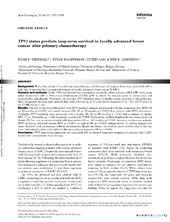| dc.description.abstract | Background: Before the advent of neoadjuvant chemotherapy, radiotherapy and surgery alone were associated with a high risk of uncontrolled locoregional relapses in locally advanced breast cancer (LABC). Material and methods: In the 1990s we initiated two neoadjuvant protocols, where patients with LABC were given either doxorubicin qW or 5-fluorouracil/mitomycin (FUMI) q3W to shrink the tumours prior to mastectomy and postoperative radiotherapy. Previously, we reported TP53 mutation status to predict a poor response to chemotherapy. Here, we present the long-term survival data, with a follow-up of 20 years in the doxorubicin (n = 90) and 15 years in the FUMI trial (n = 34). Results: Patients in the doxorubicin trial with TP53-mutated tumours experienced a shorter recurrence-free (RFS; 14 vs. 83 months, p < 0.001) and overall survival (OS; 35 vs. 90 months, p < 0.001) than patients with TP53 wt tumours. Similarily, TP53 mutations were associated with a shorter OS (22 vs. 80 months, p = 0.03) and a tendency to shorter RFS (17 vs. 33 months, p = 0.06) in patients treated with FUMI. Furthermore, axillary lymph node metastases predicted shorter OS, but only in patients treated with doxorubicin (49 vs. 142 months, p < 0.04). Applying multivariate analysis, TP53 mutations predicted inferior RFS (p < 0.001) as well as OS (p < 0.001), independently of axillary lymph node status. Isolated local recurrences, without simultaneous distant metastases, occurred in seven patients only in the two trials. Interestingly, chest wall radiation fibrosis predicted improved OS (p = 0.004). Conclusion: TP53 inactivating mutations are associated with an inferior long-term prognosis in patients with LABC treated with conventional chemotherapy. | en_US |

